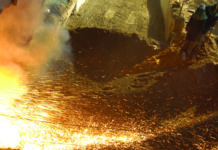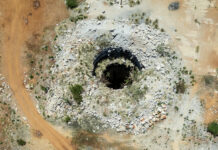
[miningmx.com] — IT should come as no surprise that Africa is becoming more popular with mining exploration companies as a place to find new sources of metal, and that London and Toronto are the favourite places to raise the capital for such exploration activities. One surprise, however, is that South Africa is not attracting enough of the capital being pumped into discovering resources and minerals, the industry has said.
According to an survey on mining exploration by Metals Economics, an industry consultancy, London now contributes 9% of worldwide junior mining company exploration budget compared with 4% in 2004. “At first glance, I think AIM (Alternative Investment Market) is drawing most of this increase from money previously invested through Australia,’ said Mike McWha, a minerals consultant working in South Africa.
The contribution of Australian-headquartered junior mining companies to exploration budget was 20% of global total in 2005, down from 24% previously. Contributions by Canadian junior mining companies also fell, down to 63% from 65%, though clearly maintaining their heavy dominance.
But new mining related investment in South Africa is perilously low.
Of the world’s major mining companies, about 26% of world spend was by South African firms, equal to $469m in 2005, some $1.8bn. However, the same survey shows that South African firms are spending a mere 5% of their budgets – $3m – in South Africa itself. According to the Mineral Corporation, there are 117 mining exploration firms active in Africa of which about 50 are South African.
Surveys of different ilks confirm the trend. The Fraser Institute 2005 Exploration Survey is to be published later this month. But in its 2004 survey, South Africa was ranked 23rd for mining prospectivity out of the 64 territories surveyed in the publication. While this is “not bad’, the country is down from 12th out of 53 in the 2003 survey. What will the 2005 survey tell us?
“Why the sudden drop?,’ said McWha of the disparity between the 2003 and 2004 results in the Fraser Institute survey. “It could be just that South Africa is falling off their radar screens as the explorers find out more about other territories. Nobody is doing green fields exploration in South Africa any more so there is nothing new to get excited about,’ he said.
The reason is thought to be relatively limited exploration opportunities – gold is largely discovered or mined out – but the country’s regulatory environment also works against mining exploration firms.
“South Africa remains a powerhouse of opportunity, but the international exploration community is staying away and will remain away in the absence of changes,’ said Andrew Mitchell, MD of Bell Dewar & Hall, an attorney with particular interest in mining. “Attracting capital risk for exploration is difficult enough without having an exploration unfriendly statutory regime,’ he said.
It’s difficult to win new prospecting licenses from Government, partly because the applicant has to accept that up to 51% of the property may end up in the hands of an empowerment firm. But it also takes too much time to get a license.
“The global perception of South Africa as an exploration destination is also not good,’ said Mitchell. “The geological data base is the best, infrastructure is acceptable, but South Africa scores very poorly on its tax regime, land claims, labour relations and so on,’ he said.
Does South Africa have to learn the lessons of its neighbours before it lightens up and encourages more inward investment?
Mines ministers from Nigeria and the Democratic Republic of Congo were highly visible at the recent Mining Indaba shindig in Cape Town in February. Its South African counterpart missed one of her presentations and was late for another. Of the 40 or so companies presenting at the conference, among the world’s biggest, only six were discussing South African exploration.











